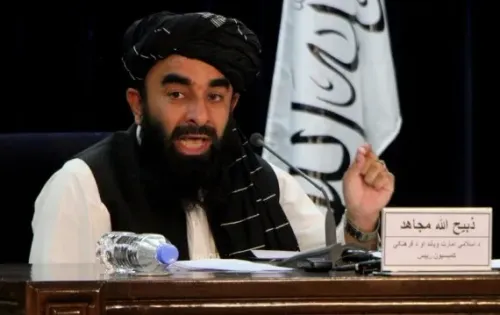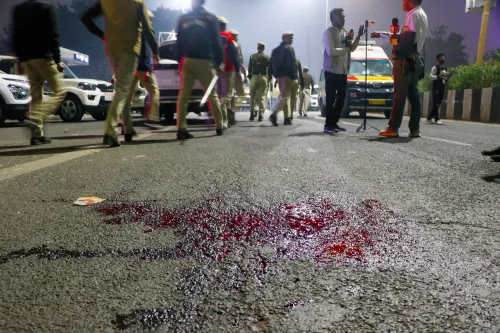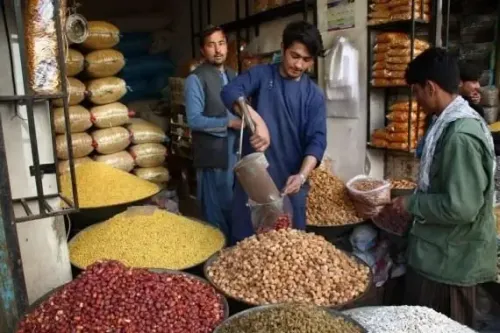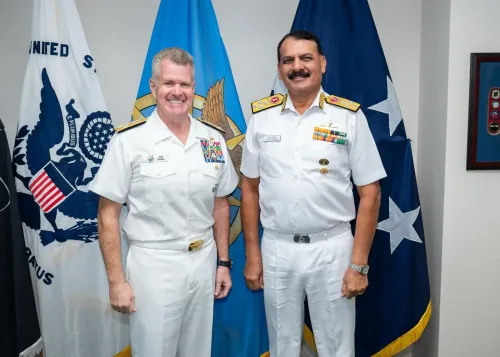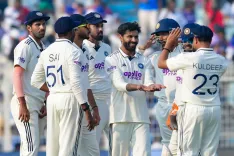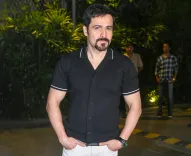EU Leadership's Visit to India Aims to Advance Free Trade Agreement Efforts Amid Trump’s Tariff Threat
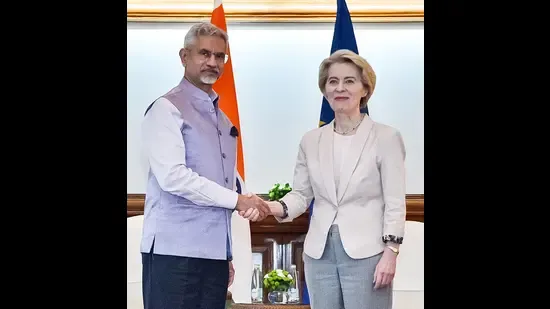
Synopsis
Key Takeaways
- EU leaders meet Indian officials to discuss FTA.
- Trump's tariff threats influence trade discussions.
- Concerns over non-tariff barriers raised by India.
- Strategic partnership emphasized between India and Europe.
- Collaboration in defense and technology is expanding.
New Delhi, Feb 28 (NationPress) In response to US President Donald Trump's warning of imposing 25% tariffs on the European Union (EU), a collective meeting between India's leaders and the EU is anticipated to invigorate efforts towards finalizing a significant free trade agreement (FTA) on Friday.
Ursula von der Leyen, the President of the European Commission, arrived in New Delhi on Thursday, accompanied by 20 members of the EU’s 27-strong College of Commissioners — marking their first combined visit to a major country since receiving a new mandate last year.
This delegation is set to engage with Prime Minister Narendra Modi and essential Cabinet officials, including External Affairs Minister S. Jaishankar, Commerce Minister Piyush Goyal, and Finance Minister Nirmala Sitharaman.
“In an age of conflicts and heightened competition, having trusted friends is vital. For Europe, India stands as such a friend and strategic ally. I will confer with @narendramodi on advancing our strategic partnership,” she stated on X after her arrival, where she was welcomed by Minister of State Anupriya Patel.
Setting the tone for her visit, Von der Leyen emphasized India as a strategic ally amidst significant geopolitical rivalry.
India is expected to raise concerns with the EU regarding the implementation of non-tariff barriers, such as a carbon border tax and regulations on deforestation, which may affect Indian micro, small, and medium enterprises (MSMEs).
The EU has noted that a primary goal of its trade discussions is to eliminate barriers and assist European businesses, particularly smaller firms, in exporting more effectively. In return, the EU must also lift trade obstacles for Indian companies, especially MSMEs, according to insiders who requested anonymity.
Trade-related matters are expected to be a central theme during the discussions between PM Modi and Von der Leyen, as well as during the talks between Piyush Goyal and EU Trade Commissioner Maros Sefcovic, who will convene in Mumbai on Saturday to prepare for the 10th round of FTA negotiations scheduled in Brussels from March 10-14 — the first discussions after a six-month hiatus since the ninth round in New Delhi last September.
Just prior to Von der Leyen’s arrival, Trump announced plans to impose 25% tariffs on goods from the EU, claiming the bloc was formed to “screw the United States.” At a cabinet meeting, Trump remarked, “We’ll be announcing it shortly... It’ll generally be 25% and will apply to cars and other products.”
The EU responded that it would react “firmly and immediately against unjustified tariffs.”
Von der Leyen started her second term (2024-29) on December 1 with a new team of commissioners.
Before her visit to New Delhi, a statement from the European Commission underscored the importance of enhancing ties in key sectors crucial for the prosperity and security of both Europe and India.
“In this time of intense geopolitical competition, Europe stands for openness, partnership, and outreach. We aim to deepen our relationship with one of our most trusted friends and allies – India,” she was quoted as saying.
“Europe and India are like-minded partners, united by the belief that democracy best serves the people... We are dedicated to strengthening our strategic partnership to enhance trade, economic security, resilient supply chains, a unified tech agenda, and fortified security and defense collaboration,” she added.
India seeks to address matters like the Carbon Border Adjustment Mechanism (CBAM) and deforestation regulations within specific forums rather than conflating them with trade discussions and using them as import restrictions.
India’s stance is that CBAM could result in tariffs as high as 35% on imports of high-carbon products such as cement, aluminum, fertilizers, chemicals including hydrogen, iron, and steel.
The second ministerial meeting of the India-EU Trade and Technology Council (TTC), established in 2022 to oversee collaboration in digital technologies, green technologies, trade, and resilient supply chains, will also take place on Friday.
The Indian delegation will include EAM Jaishankar, Piyush Goyal, and Electronics and Information Technology Minister Ashwini Vaishnaw. Thus far, the EU has only set up a TTC with two nations: India and the US.
Cooperation on telecommunications, 6G, artificial intelligence, and semiconductors are anticipated topics in the TTC discussions.
“This partnership is critically important for both parties,” a senior official from the external affairs ministry remarked. “Collaboration has intensified, and there is a strong commitment to achieving concrete results.”
Defense and security collaboration, particularly enhanced coordination between the Indian Navy and the navies of EU member states in areas like the Red Sea and joint exercises, has become another vital aspect of the partnership. Both sides are negotiating a proposed agreement on information security that would permit India to engage in EU-led defense initiatives. To strengthen defense ties, the EU will assign a liaison officer to the Indian Navy’s Information Fusion Centre-Indian Ocean Region (IFC-IOR), established in Gurugram in 2018 to monitor shipping and critical developments in the area.
Von der Leyen commenced her visit by paying tribute to Mahatma Gandhi at Rajghat. After their meeting on Thursday night, Jaishankar tweeted on X: “I appreciate her ideas on revitalizing India’s engagement with Europe. The extensive participation of Indian Ministers and EU College of Commissioners during this visit underscores the significance we attribute to deeper India-EU relations.”
While the EU delegation is likely to address the Russia-Ukraine conflict and the enforcement of sanctions related to trade with Russia, the external affairs ministry official indicated that New Delhi has made it clear that a resolution can only be achieved by bringing both Russia and Ukraine to the negotiating table.
“Regarding sanctions, we are not breaching UN sanctions or any multilateral agreements. We are open to dialogue with the EU on this topic and have requested further information,” the official noted, referring to the EU imposing sanctions on five Indian entities for supplying sensitive technologies and components to Russia.
As the largest trading partner for India in goods, the EU's bilateral goods trade exceeded $137 billion in 2023-24, with services trade amounting to over $51 billion. Trade between the two partners has surged by 90% over the past decade, with Indian exports to the EU valued at $76 billion in 2023-24. Cumulative FDI inflows from the EU to India from April 2000 to September 2024 totalled $117.4 billion (16.6% of total FDI equity inflows), while India's FDI outflows to the EU reached $40.04 billion from April 2000 to March 2024.
The FTA negotiations commenced in 2007 but were stalled in 2013 due to “a gap in ambition.” Discussions resumed in 2022 following the India-EU Summit in May 2021.

